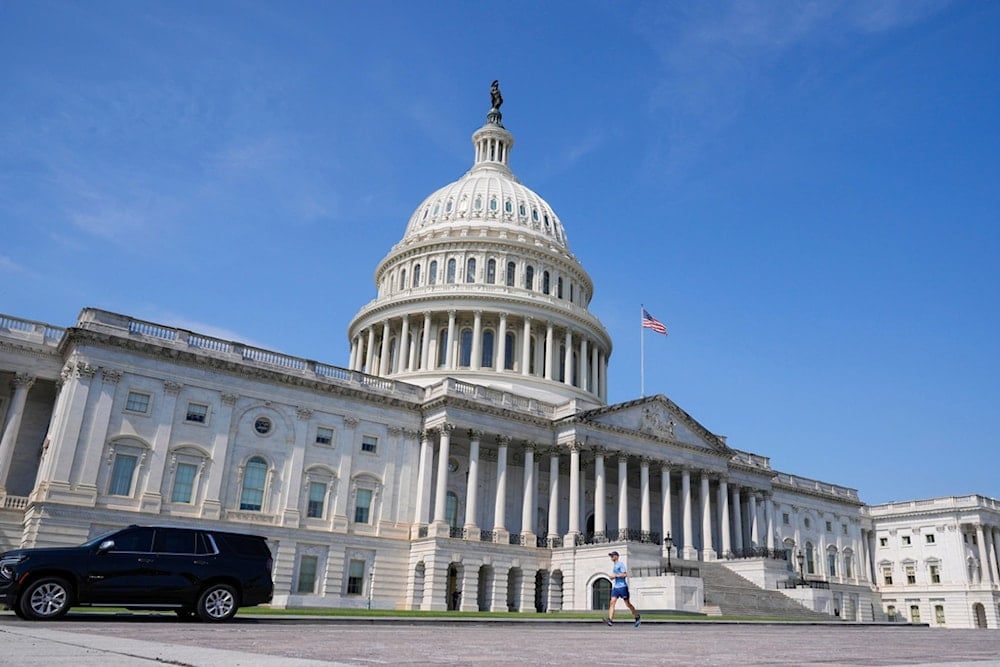Trump officials questioned as intel disputes Venezuela drug claims
Fresh intelligence contradicting US drug-trafficking claims against Venezuela has intensified scrutiny of the Trump administration's lethal boat strikes and expanding regional military campaign.
-

The US Capitol building is photographed on Monday, September 22, 2025, in Washington. (AP Photo/Mariam Zuhaib)
Senior members of the Trump administration met with lawmakers on Wednesday to address growing concerns over a series of lethal US strikes targeting vessels off the coast of Venezuela, after weeks of criticism in Congress over the lack of information provided about the operation, according to Reuters.
The meeting came amid new intelligence leaks and investigative reports that have cast further doubt on Washington's justification for the campaign, including assessments showing that Venezuela plays only a minimal role in supplying narcotics to the United States.
Secretary of State Marco Rubio and Secretary of Defense Pete Hegseth held a closed-door briefing with Republican and Democratic leaders from both chambers, outlining US attacks on boats in the Caribbean and Pacific that have resulted in dozens of deaths since early September. The administration has argued that the strikes form part of a broader effort to combat drug trafficking, even as intelligence reviewed by Trump reportedly found that most cartel-linked sites were located not in Venezuela but in Colombia and Mexico, undermining claims that Caracas was central to the narcotics trade.
The administration maintains the vessels were part of drug-smuggling networks, though it has not released evidence publicly or explained why the boats were destroyed rather than intercepted. Investigations published earlier this week revealed that internal US intelligence contradicted the narrative pushed by Rubio and other senior officials, raising questions about whether the operation was driven by geopolitical motivations rather than narcotics enforcement.
Dropsite News reported that when intelligence agencies were tasked with identifying ground targets inside Venezuela, they largely found sites in Colombia, Mexico, and border areas where the Venezuelan state has limited control.
Disputed strike justifications
Several lawmakers said officials told them the targeted vessels were carrying cocaine, not fentanyl, and presented what they described as the legal justification for the strikes. Some legal scholars have warned that the decision to use lethal force may run afoul of international law as well as US statutes prohibiting murder or assassination. The concerns have grown sharper after it emerged that Pentagon lawyers declined to participate in earlier closed-door briefings, citing unresolved legal questions surrounding the strikes.
Republican leaders signaled satisfaction with the briefing. House Speaker Mike Johnson praised the underlying intelligence as "exquisite," adding that the United States knew who was aboard the boats "almost to a person."
He continued, "What I know from what I've learned so far, we have high reliability. These are the cartels. These are the people involved in it. They are doing this deliberately. These are not people who are haphazardly on a boat. They are intending to traffic into the country, and it does great harm to the American people."
Venezuela crisis deepens
Tensions between Washington and Caracas have intensified as the strikes continue, especially after President Donald Trump authorized a wider military buildup in the region and signaled potential action against alleged drug-related targets inside Venezuela. Intelligence reports published on November 2 stated that the US campaign was expanding into Colombia and Mexico after analysts were unable to substantiate claims that Venezuela was a major narcotics hub. Since September 2, at least 15 US strikes in the Caribbean and two in the Eastern Pacific have killed more than 60 people, most of them without conclusive proof of criminal activity.
Colombia's President Gustavo Petro has publicly clashed with Trump over the operation, noting that some of the victims were Colombian nationals, prompting Trump to impose sanctions on him. Petro, in remarks issued on November 4, warned that any foreign invasion of Venezuela would amplify drug trafficking, expand illegal markets, and fuel the theft of oil, gasoline, and minerals. He argued that strengthening Venezuelan state institutions, not military intervention, was the only effective path forward.
Democratic lawmakers remained sharply critical. Senator Mark Warner, who leads the Senate Intelligence Committee, argued the administration's secrecy has damaged public and regional confidence.
"Kinetic strikes without actually interdicting and demonstrating to the American public that these are carrying drugs and full of bad guys, I think, is a huge mistake that undermines confidence in the administration's actions," he told Reuters. Warner previously condemned the administration for holding an initial briefing that excluded Democrats entirely.
Brazilian President Luiz Inácio Lula da Silva also weighed in, urging Washington to avoid a ground incursion and offering to mediate between the US and Venezuela. He said regional leaders planned to address the crisis at the upcoming CELAC summit on November 9-10, warning that the US military buildup risked triggering a wider confrontation.
Pentagon rift
Both parties have criticized the Pentagon in recent days for failing to keep Congress informed on national security matters. Lawmakers suggested that some senior defense officials may be working at odds with Trump's own directives, an unusual instance of bipartisan frustration. Reports from Axios and CNN highlighted internal dissent, with SOUTHCOM Commander Admiral Alvin Holsey and Lieutenant General JP McGee reportedly stepping down after disagreements over the legality and scope of operations in the Caribbean.
The Pentagon, which Trump has renamed the Department of War, rejected claims on Wednesday that top policy official Elbridge Colby withheld critical information, reflecting a widening rift between the department and members of Congress. Nonetheless, the departures and internal objections illustrate a growing divide within the US national security establishment over the administration's strategy, its legal basis, and the long-term consequences of escalating military pressure on Venezuela.
Read more: Maduro hails UN Rights chief's rebuke of US violations in Caribbean

 6 Min Read
6 Min Read








